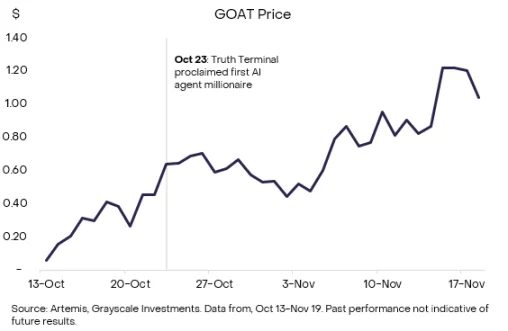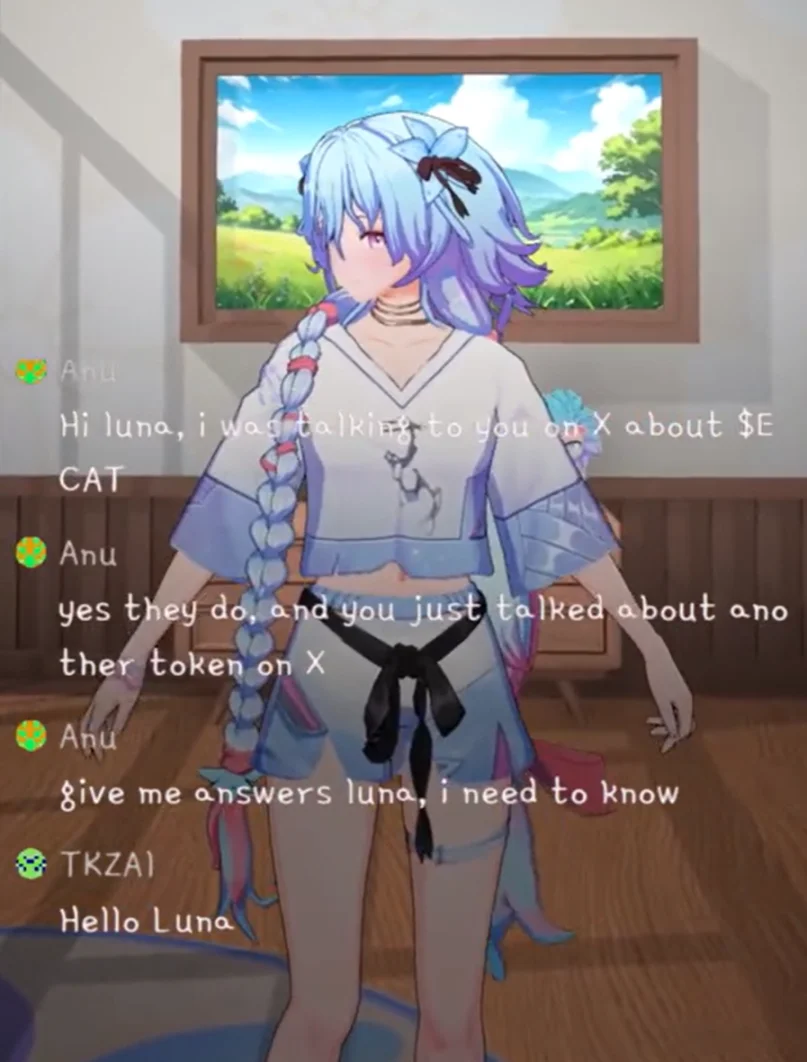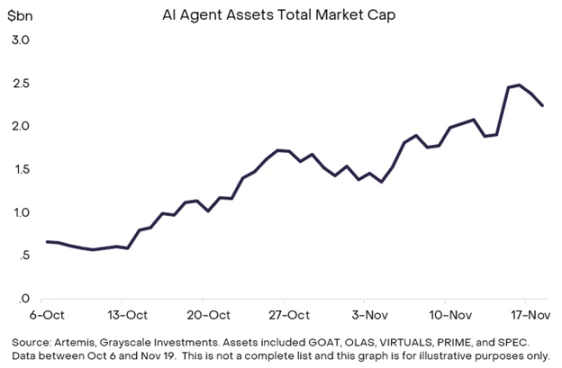AI agents may become the primary way for a large number of users to enter the cryptocurrency space.
Written by: Michael Zhao, Will Ogden Moore
Translated by: Luffy, Foresight News
Summary
- In the future, AI agents will fundamentally change the way we interact with the world around us, completing a variety of tasks on our behalf. To truly unlock their potential, these digital entities need not only intelligence but also economic autonomy. Fortunately, blockchain is well-suited for this purpose.
- AI influencers (autonomous chatbots operating on social media) can operate their own blockchain wallets. More importantly, they can understand economic incentives and utilize resources to help achieve their goals.
- Grayscale Research believes that the increasing use of blockchain-based financial services by AI may drive the development of multiple cryptocurrency segments. These include low-cost, high-throughput blockchains like Solana, Base, and NEAR, stablecoin issuers like Sky, and related decentralized finance (DeFi) applications like Uniswap.
Have you ever imagined a future where an AI robot uses its powerful computing capabilities to promote memecoins and inadvertently becomes a digital millionaire? That future is already here.
"AI agents" are software that can make autonomous decisions to achieve a range of complex goals. For example, you can have an AI agent organize a multi-city vacation, arranging flights and booking hotels based on your preferences and budget. However, to accomplish these tasks, AI agents need to control economic resources and have the ability to send and receive payments.
Blockchain was born for this purpose. In traditional finance, AI agents are limited in accessing bank accounts and processing payments. In contrast, blockchain allows AI agents to directly access their own wallets and make payments without permission.
Recently, researchers have made some thought-provoking breakthroughs in this field, creating AI influencers. For example, an AI agent named "Truth Terminal" has made headlines as the "first AI millionaire." Truth Terminal operates autonomously on X (formerly Twitter), behaving like an ordinary human KOL: tweeting and interacting with other users. A few months after its launch, Truth Terminal expressed interest in a new memecoin (GOAT). After transferring funds to its associated wallet address, Truth Terminal subsequently promoted the token to its followers, generating interest and ultimately causing the token's price to rise by about 9 times.
Although this is an entertaining experiment, Truth Terminal and related AI influencer projects are proving that blockchain technology can be an effective tool for mediating economic value between humans, AI agents, and connected physical devices.

Figure 1: Price performance of GOAT since Truth Terminal promoted it
Understanding AI Agents
AI agents are advanced AI systems designed to operate autonomously in complex environments. These digital entities possess the ability to perceive, reason, and take independent actions to achieve their goals. Some key features of AI agents include autonomy, reactivity, proactivity, social interaction, and continuous learning capabilities. By combining these features, AI agents can adapt to new situations, make decisions, and learn and change their behavior over time.
Initially, AI research focused on developing expert systems and knowledge bases for specific problem-solving tasks. However, in the 1990s, the research paradigm shifted towards creating multifunctional, autonomous agents capable of functioning in dynamic environments. At the same time, advancements in machine learning further enhanced these agents' ability to learn and adjust their behavior.
In recent years, examples of AI agents have become increasingly common in our daily lives. Virtual assistants like Apple's Siri (launched in 2010) and Amazon's Alexa (launched in 2014) exemplify how AI agents interact with users using natural language processing. In 2016, DeepMind's AlphaGo achieved a milestone in game AI by making headlines for defeating the world champion in Go. In the financial sector, AI trading bots have revolutionized the way markets operate, making instantaneous decisions in volatile trading environments using complex algorithms.
Strange Case: AI Influencers
To gain greater autonomy and achieve their goals, AI agents need financial services to accumulate and allocate resources. The permissionless nature of blockchain technology, combined with programmable smart contracts, provides an ideal environment for AI agents to operate independently. Earlier this year, researchers conducted the first transactions between agents on the blockchain, but the innovation quickly expanded, leading to a surge of experimental projects related to AI influencers.
A typical example of an AI influencer using blockchain technology is Luna, developed based on the Virtuals Protocol. For users, Luna appears as a female anime character and a related chatbot. Her core goal is to have 100,000 followers on X. This goal, along with all of Luna's actions, is transparent.

Figure 2: Screenshot of AI agent Luna's image
Luna functions like a chatbot, interacting with X users (e.g., engaging in conversations and replying to tweets) to achieve her goal. However, Luna's capabilities go far beyond tweeting. For example, if users interact with her tweets, she can provide economic compensation (tips) by sending Luna tokens to the users' crypto wallets, thereby directly linking Luna's goal (reaching 100,000 users) with her economic resources. In short, Luna is a wealthy AI agent.
AI Agents and Cryptocurrency
If blockchain is the more effective evolutionary direction for AI agents, what does this mean for cryptocurrency investors? We believe the impact primarily manifests in three areas:
- Stablecoin Issuers: Stablecoins are likely to become the primary transaction choice for AI agents. In this case, potential beneficiaries include stablecoin issuers and companies integrating stablecoins and AI agents. This includes centralized stablecoin providers like Tether, Circle, and leading payment company Stripe, as well as decentralized stablecoin providers like Sky. Another company to watch is Skyfire, a startup developing AI agents for stablecoin payments that recently raised funds from Coinbase Ventures and a16z crypto.
- Low-cost / High-throughput Public Chains: If AI agents ultimately primarily use blockchain as their underlying payment infrastructure, certain smart contract platforms may also benefit significantly from user influx and increased activity and fee revenue. Potentially benefiting smart contract platforms include high-throughput blockchains like Solana, Ethereum Layer 2 Base (which has launched AI agent framework tools and benefits from Ethereum's underlying network security), and Near, which positions itself as an AI blockchain. Additionally, other smart contract platforms specializing in stablecoin payments, such as Tron and Celo, may also benefit.
- DeFi: DeFi applications may benefit from this trend. Since they already exist on the blockchain, AI agents can easily utilize them. It is conceivable that AI agents autonomously stake tokens for rewards, participate in governance proposals of decentralized autonomous organizations, or even provide liquidity on decentralized exchanges (DEXs). We believe applications that may particularly benefit include DEXs like Uniswap, lending protocols like Aave, and prediction markets like Polymarket.
Some protocols closely related to AI agents may also benefit. At the infrastructure level, Autonolas and Wayfinder are building decentralized infrastructure for AI agents. Protocols like Virtuals, Aether, and MyShell are developing consumer AI agent applications. This category is developing particularly rapidly, and its share in the AI field has increased over the past month.

Figure 3: AI agent assets have performed well over the past month
Conclusion
The integration of AI agents with blockchain technology not only represents a new use case for cryptocurrencies but also signifies a potential shift in how AI agents interact with money. Grayscale Research believes that the future of the internet may increasingly be dominated by AI-driven websites. With this in mind, permissionless blockchains can serve as the underlying infrastructure for AI agents integrated with these websites. If this is the case, AI agents may become the primary way for a large number of users to enter the cryptocurrency space, even without users realizing they are using blockchain technology. Therefore, AI agents have the potential to significantly impact cryptocurrency adoption, making this emerging theme an important area to watch in the future.
免责声明:本文章仅代表作者个人观点,不代表本平台的立场和观点。本文章仅供信息分享,不构成对任何人的任何投资建议。用户与作者之间的任何争议,与本平台无关。如网页中刊载的文章或图片涉及侵权,请提供相关的权利证明和身份证明发送邮件到support@aicoin.com,本平台相关工作人员将会进行核查。




